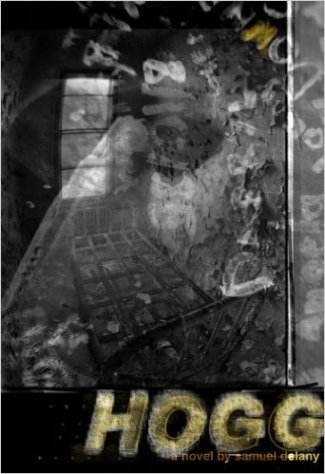 This book fetishises ugliness, in both senses of the word “fetish”. It fixates upon it, and also elevates it to the level of a talisman made of vomit and putrescence. Hogg doesn’t do softness, it does rot. It doesn’t do hardness, it does blood-stained tire irons and blood-engorged extremities. It doesn’t do dryness, except for hard industrial sheet metal that scrapes your knees during oral sex. It doesn’t do wetness, it does blood, spit, mucus, and bodily fluids. Stephen King once said that being hangover gives you an uncanny ability to zero in on only the ugliest things in your surroundings. If so, Hogg‘s having the worst morning after in history. And it’s written by a legendary science fiction author.
This book fetishises ugliness, in both senses of the word “fetish”. It fixates upon it, and also elevates it to the level of a talisman made of vomit and putrescence. Hogg doesn’t do softness, it does rot. It doesn’t do hardness, it does blood-stained tire irons and blood-engorged extremities. It doesn’t do dryness, except for hard industrial sheet metal that scrapes your knees during oral sex. It doesn’t do wetness, it does blood, spit, mucus, and bodily fluids. Stephen King once said that being hangover gives you an uncanny ability to zero in on only the ugliest things in your surroundings. If so, Hogg‘s having the worst morning after in history. And it’s written by a legendary science fiction author.
It’s an eternal complaint: the Dear Reader betrayed. David Gemmell once described buying Michael Moorcock book, expecting gallivanting adventures with dragons and wizards, and getting a dragonless yarn about a black transvestite. He said that established writers should only write what their readers have come to expect, and all experimentation should be reserved for pen names.
Whether or not you agree, Hogg is probably Exhibit A in the prosecution’s case. I’ve never heard of someone playing against type like this, before or since. Delany’s a watchword for erudite, dense science fiction, but this is a book full of scatological atrocities. You can almost see publishers’ wilting away from revealing the author. On my edition’s cover, the words “a novel by Samuel R Delany” are printed in type so small they’re almost invisible (rendering the book an authorless curiosity that sprang forth fully formed from Sade’s third eye, or something).
The story’s pretty incidental: a young man falls in with a rough crowd and gets sodomised, violated, et cetera. Sometimes it’s been marketed as gay erotica, though there’s nothing erotic about it. The date feels like it falls somewhere in the 60s or 70s. It also feels timeless, and also placeless – where are we, exactly? Hard to say. Urban hellholes become rural hellholes. At some point we end up along the coast, and like Edgar Allen Poe found the sea’s a pretty big hellhole in its own right.
Hogg‘s a bit like the fourth story in Hubert Selby’s Last Exit to Brooklyn, mixed with whatever Jack Kerouac “wandering around raising a ruckus” story you like the best. It has some influences from older transgressive lit, and is probably old enough that it could be considered an influence to many others.
Or maybe not. The book was written in 1969, a time when stories could conceivably be censored for obscenity and public harm (and their authors sent to prison). It was a trunk novel for decades, before finally seeing publication in 1995. A shame. Hogg really belongs as part of the 1960s counterculture. It likely would have harmed Delany’s credibility among the sci fi literati (such as it was), but again, that’s what pen names are for. Let rumors circulate for years about who wrote that godawful Hogg abomination.
Besides…trying to push the boundaries of good taste in the fucking nineties? That’s like trying to make it big with rap metal in 2004. What’s shocking for the 60s isn’t so shocking next to Stokoe’s “Cows”, Aldapuerta’s The Eyes, and Palahniuk’s “Guts” (to pull three examples out of my ass). Hogg has to beat off some stiff competition, fnarr fnarr, and it comes out looking rather limp. Hogg wants to be the bleeding edge. It ends up being more of a historical curiosity, a book that can only be written about using the past tense.
No Comments »
Comments are moderated and may take up to 24 hours to appear.
No comments yet.
